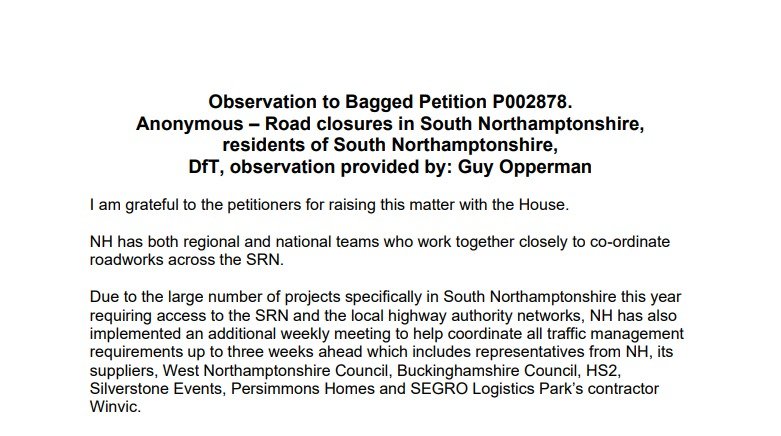Andrea Leadsom Receives Response to Road Closure Petition

Thank you to everyone that signed my petition on road closures in South Northamptonshire.
Road closures have blighted our area over the past 18 months, and I am constantly challenging National Highways, WNC, HS2 Persimmon and all stakeholders to think of residents when they close roads.
I will continue to fight in 2024 to keep South Northamptonshire moving. You can find the full text of the response below:
I am grateful to the petitioners for raising this matter with the House.
NH has both regional and national teams who work together closely to co-ordinate roadworks across the SRN.
Due to the large number of projects specifically in South Northamptonshire this year requiring access to the SRN and the local highway authority networks, NH has also implemented an additional weekly meeting to help coordinate all traffic management requirements up to three weeks ahead which includes representatives from NH, its suppliers, West Northamptonshire Council, Buckinghamshire Council, HS2, Silverstone Events, Persimmons Homes and SEGRO Logistics Park’s contractor Winvic.
NH is also a statutory consultee in the planning process, meaning that local planning authorities must seek its views as part of any consultation on a planning application. NH review the information submitted with the application to assess the impact on the SRN and provide a recommendation to the Planning Authority. The Planning Authority will then take this into account when considering whether planning permission should be granted.
Turning to the role of local highway authorities (LHAs). LHAs are responsible for all other roads that are not part of the SRN, including maintenance and closures. The Highways Act 1980 and Traffic Management Act 2004 prescribe how local authorities manage their road networks and they have to take into consideration other maintenance/closures in the area when considering any new works/closures and diversion routes.
Traffic Regulation Orders (TROs) are often needed to close roads. LAs are required by legislation to ensure local residents are given 7 days’ notice in the case of temporary closures for road works and to consult for 21 days in the case of permanent TROs.
If roads are being closed for street or road works, LAs have a duty under the New Roads and Street Works Act 1991 to coordinate works with the aim of reducing the impact on road users and local communities. Both utility companies and LAs must apply for a permit before works can begin.
The DfT’s street manager digital service for planning and co-ordinating road works is in use by all utility companies and LAs in England. This also supports co-ordination of works, along with statutory guidance which DfT recently updated https://www.gov.uk/government/publications/street-works-co-ordination
Data on live and planned works is streamed by the DfT for use by companies who provide websites and apps for the travelling public.
The High-Speed Rail (London-West Midlands) Act 2017 and the accompanying Environmental Minimum Requirements (including binding Undertakings and Assurances and the Code of Construction Practice (CoCP)) require HS2 Ltd to minimise the impacts of construction traffic on local communities.
Further co-ordination meetings may be established between NH and HS2 to assist with the programming of activities on the motorway and trunk road networks. HS2 Ltd or contractors will also attend local highway authority’s New Roads and Street Works Act (NRSWA) meetings as requested by the highway authority to coordinate traffic management activity with utility companies, local authority highway works programmes and developer programmes.





